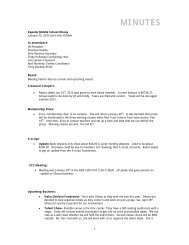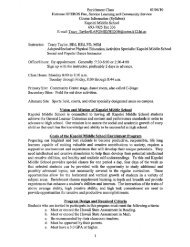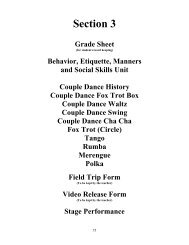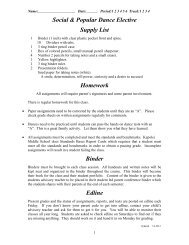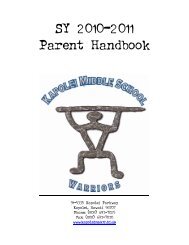Book of Student Success - Kapolei Middle School
Book of Student Success - Kapolei Middle School
Book of Student Success - Kapolei Middle School
You also want an ePaper? Increase the reach of your titles
YUMPU automatically turns print PDFs into web optimized ePapers that Google loves.
The <strong>Book</strong><br />
<strong>of</strong><br />
<strong>Student</strong> <strong>Success</strong><br />
Ohohia 7<br />
2008-2009<br />
Name<br />
_________________________<br />
Advisor
Table <strong>of</strong> Contents<br />
I. Invitation<br />
II. General Procedures and Expectations<br />
a. The B.O.S.S.<br />
b. Getting Organized<br />
c. The Planner<br />
d. Accelerated Reader <strong>Book</strong><br />
e. <strong>School</strong> Identification Cards<br />
f. Dress Code<br />
g. <strong>School</strong> Readiness Policy<br />
h. Classroom Procedures<br />
III. Social Expectations<br />
a. Take Cares<br />
b. Etiquette<br />
c. P.R.A.C.T.I.C.E.<br />
d. Guidelines for Behavior<br />
e. Behavior Reflection<br />
IV. Academic Expectations<br />
a. The General Learner Outcomes<br />
b. GLO Matching Exercise<br />
V. Bonus Materials<br />
a. Secrets <strong>of</strong> <strong>Success</strong>ful <strong>Student</strong>s<br />
b. Avoiding Problems<br />
VI. BOSS Acknowledgment<br />
2
I. Invitation<br />
Mr. DeMink<br />
Ms. Kerr<br />
Mrs. DeMink-Carthew<br />
Mr. Gonsalves<br />
Mr. Taylor<br />
Mrs. Villarmia<br />
Ms. Lehn<br />
Mrs. Ka`eha<br />
And<br />
Ms. Maio<br />
cordially invite you<br />
to participate in a once in a lifetime experience---7 th Grade with Ohohia-7<br />
When:<br />
Where:<br />
In Honor <strong>of</strong>;<br />
What to Bring:<br />
2008-2009 <strong>School</strong> Year<br />
<strong>Kapolei</strong> <strong>Middle</strong> <strong>School</strong><br />
The Joy <strong>of</strong> Learning<br />
The B.O.S.S. and a positive attitude<br />
Congratulations! You have the distinguished honor <strong>of</strong> being a part <strong>of</strong> Ohohia-7.<br />
This is our gift to you: The <strong>Book</strong> <strong>of</strong> <strong>Student</strong> <strong>Success</strong> (B.O.S.S.). The B.O.S.S was<br />
created to assist you in having a great year here. The rules, expectations, and<br />
procedures will help you have a successful school experience not only this year but<br />
for many years to come. Your reading and understanding <strong>of</strong> The B.O.S.S. is<br />
required as well as the sharing <strong>of</strong> The B.O.S.S. with your family.<br />
3
II. General Procedures and Expectations<br />
The <strong>Book</strong> <strong>of</strong> <strong>Student</strong> <strong>Success</strong><br />
The <strong>Book</strong> <strong>of</strong> <strong>Student</strong> <strong>Success</strong> – the title says it all. If you follow the advice,<br />
procedures, rules, and expectations we will guarantee a great seventh grade year.<br />
This is not your typical “30 day, money back” guarantee you hear on TV all the time.<br />
This is a lifetime guarantee – the advice you receive here, if followed, will help you<br />
be successful in any grade and any school you go to. Sound interesting or too good<br />
to be true? Read on.<br />
How was your last school year?<br />
What problems did you experience that you do not want to repeat this year?<br />
(<strong>School</strong> work? Teachers? Administration? Organization? Lunch? Other<br />
<strong>Student</strong>s?)<br />
What new challenges are you in store for this year?<br />
How can you face and conquer these challenges?<br />
The great thing about school and life is . . . there is always another chance to<br />
improve yourself. It is up to you whether you choose to make positive changes and<br />
learn from mistakes. There is no time like RIGHT NOW to make a decision that<br />
this year will be your best year!<br />
The BOSS was written to help you have a great year. It outlines the<br />
expectations your teachers have <strong>of</strong> you concerning academics and social situations.<br />
We are looking forward to a great year with you. Enjoy the journey.<br />
4
Getting Organized<br />
Answer the following questions:<br />
1. In order to use the computers on campus you and a parent/guardian must<br />
sign the Acceptable Use Policy (AUP), where would you find this?<br />
2. You forgot what your homework assignment is for Math. Where would you<br />
look for this information?<br />
3. You need to use the bathroom badly!!!! What needs to be signed in order to<br />
go during class?<br />
4. Your parents have a question about the upcoming field trip and need to ask a<br />
question to your advisory teacher, where can they write this question?<br />
5. You’ve got a headache, you feel feverish, you’re feeling dizzy – you need to<br />
go to the health room, what do you need signed?<br />
6. You need to read up on the school dress code. Where is this information?<br />
7. You want to know when your next intersession break is, where would you find<br />
this information?<br />
The planner, planner, planner. . . It would be interesting to tally up how many times<br />
you will hear the word “PLANNER” this year. Our guess is more than 1,000 times.<br />
Why so much?<br />
BECAUSE THE PLANNER IS IMPORTANT!!!!!<br />
5
<strong>Student</strong> Planner<br />
The planner is to be brought to school every day for use in all classes. A student<br />
planner is provided free <strong>of</strong> charge for every child entering <strong>Kapolei</strong> <strong>Middle</strong> <strong>School</strong>.<br />
The planner teachers students organizational skills ad responsibility; the planner is<br />
also a means <strong>of</strong> communication between the student, teacher, and parents. It is<br />
the student’s responsibility to replace the planner if it is lost, stolen, or damaged<br />
(i.e. if pages are torn out, defaced, or purposefully modified in any way). Additional<br />
student planners may be purchased for $5.00 from the front <strong>of</strong>fice.<br />
<strong>Student</strong> Responsibilities:<br />
Bring the planner to school EVERY DAY.<br />
Write in class work, homework, deadlines, and reminders for each class daily.<br />
Show the planner to your parents every day and request a signature.<br />
Show the planner to your teacher if parents have written a note to the teacher.<br />
Parent Responsibilities:<br />
Check the planner EACH DAY to see if your child is completing his/her work<br />
and see if there are any messages from the school.<br />
Sign the planner daily to verify that you have seen the actual assignment listed<br />
in the planner and/or any messages sent home.<br />
Write notes to the teacher as needed if you have questions (i.e. need<br />
clarification about an assignment) or concerns.<br />
Accelerated Reader <strong>Book</strong><br />
This year as part <strong>of</strong> your Accelerated Reader class, you will be expected to bring<br />
your Accelerated Reader book with you every day to school. You will use this book<br />
every morning to work towards meeting your reading goals as well as the start <strong>of</strong><br />
each class period after filling out your planner. You can’t progress in reading<br />
without a book to read, right? Bringing this book to school every day will be<br />
essential to your success in this class.<br />
Forgetting your AR book will result in serving a team detention during morning<br />
recess.<br />
6
<strong>School</strong> ID<br />
Your school ID has also been provided for you free <strong>of</strong> charge, along with a plastic<br />
holder and lanyard. Name three ways that your ID is used on campus:<br />
_________________ _________________ _________________<br />
ID CARDS MUST BE WORN ON A LANYARD IN A PLASTIC POCKET<br />
HOLDER AT ALL TIMES WHEN ON CAMPUS. <strong>Student</strong>s without any <strong>of</strong> the<br />
above will be subject to disciplinary action under the <strong>School</strong> Readiness Policy. Do<br />
not discard or misplace your ID. ID’s MUST be kept free <strong>of</strong> stickers, markings,<br />
or any other kind <strong>of</strong> damage. If any <strong>of</strong> the above is lost or stolen, or your ID<br />
card is defaced or damaged, students MUST purchase a replacement immediately<br />
at the following prices:<br />
Brand New ID (includes plastic pocket) $5.00<br />
Replacement ID* (includes plastic pocket)<br />
$3.00 *<strong>Student</strong> MUST turn in old ID to qualify for this price<br />
Lanyard $3.00<br />
<strong>Student</strong>s may use their own lanyard, as long as it is in school dress code (i.e. no<br />
words, logos, or pictures containing alcohol, tobacco, drugs, pr<strong>of</strong>anity, or sexual<br />
connotations, etc.). However, even if students provide their own lanyard, plastic<br />
pocket holders still must be used. ID cards may not be worn on any item other<br />
than the lanyard (i.e. jewelry, chains, shirt sleeves, etc.).<br />
ID checks will be conducted daily upon entry into each period. If the ID card is<br />
lost or forgotten at home, students may request a temporary ID from their<br />
AR/Advisory teacher. Each instance will result in an infraction in accordance with<br />
the <strong>School</strong> Readiness Policy. If you have purchased a new ID, you will be notified<br />
through the morning bulletin or over the loud speakers to pick up your new ID.<br />
Picture taking is not necessary; your photo is on file.<br />
Please note that a temporary ID may not be used to purchase lunch. <strong>Student</strong>s<br />
must get a meal card from the front <strong>of</strong>fice either before school or morning recess.<br />
Also, you are only allowed 5 meal cards in one school year, so make sure you are<br />
responsible with your ID.<br />
7
<strong>Kapolei</strong> <strong>Middle</strong> <strong>School</strong><br />
Uniform and Dress Code Policy<br />
<strong>Kapolei</strong> <strong>Middle</strong> <strong>School</strong> has chosen to adopt a uniform policy. Beginning the 2008 –<br />
2009 school year, all students attending <strong>Kapolei</strong> <strong>Middle</strong> <strong>School</strong> will be required to<br />
wear a school uniform consisting <strong>of</strong> a uniform t-shirt, polo shirt or long sleeve<br />
shirt. <strong>Student</strong>s may select shorts, pants or skirts based on the dress code listed<br />
below. <strong>Student</strong>s are required to wear a clean school uniform daily. The school<br />
community believes that school uniforms have a positive effect on the atmosphere<br />
for learning. <strong>School</strong> uniforms will also help address aspects <strong>of</strong> our students’<br />
appearance, appropriateness, safety, and identity.<br />
The Uniform<br />
Uniform shirts will be worn as designed.<br />
The form and design <strong>of</strong> these shirts shall not be changed or altered in any way.<br />
Wash Wednesday<br />
All students are required to wear the school uniform on Mondays, Tuesdays,<br />
Thursdays and Fridays. On Wednesdays, however, students may wear<br />
appropriate clothes which conform to the school dress code.<br />
Dress Code<br />
All clothing and accessories must be free <strong>of</strong> messages relating to drugs, gangs,<br />
sex or pr<strong>of</strong>anity.<br />
All gang related fashion is prohibited.<br />
Only jackets and sweaters with front top-to-bottom buttons or zippers are<br />
allowed. These items are considered outer garments only and are not to be<br />
worn in place <strong>of</strong>, but may be worn with a KMS uniform shirt which must be<br />
visible. Hoods must not be worn during school.<br />
Hems <strong>of</strong> shorts and skirts must not be shorter than the tip <strong>of</strong> the middle<br />
finger when the student is standing with arms down.<br />
Appropriately sized pants must be secure at the waist with no undergarments<br />
showing.<br />
Sleeveless tops, clothing that reveals cleavage, midriff and/or stomach are not<br />
acceptable.<br />
Alternate uniforms for PE/Intramural sports should be worn only in their<br />
respective activity. <strong>Student</strong>s should be in KMS uniforms when attending<br />
classes and while on campus (before, during or after school).<br />
8
Baseball caps, visors, stocking caps, head covers, wristbands, sweatbands,<br />
headbands, leg bands and sunglasses with the exception <strong>of</strong> prescription<br />
glasses are not allowed in school. Custodians and physical education teachers<br />
may wear headgear and dark glasses in the course <strong>of</strong> their outdoor duties.<br />
Headgear may be worn for outdoor activities at the discretion <strong>of</strong> the<br />
teacher/s involved in the activity.<br />
Exceptions:<br />
Event is at the start <strong>of</strong> the school day, in which the alternate uniform (for<br />
PE/Intramural Sports) can be worn to school. If students are returning to<br />
the school campus and attending classes, students should change into KMS<br />
uniforms. If there are no classes to attend, students should either remain<br />
in their alternate uniform or change into the KMS uniform.<br />
Event is at the end <strong>of</strong> the school day, in which the KMS uniform is worn up until<br />
the event. <strong>Student</strong>s should change into their alternate uniform (Intramural<br />
Sports/PE) and leave campus.<br />
Event is in the middle <strong>of</strong> the school day, in which the KMS uniform is worn up<br />
until the event. <strong>Student</strong>s can change into their alternate uniform<br />
(Intramural Sports/PE) and upon return to campus; students should change<br />
back to the KMS uniform if attending classes. IF not attending classes<br />
students should remain in their alternate uniform or change into the KMS<br />
uniform.<br />
Loaner Uniform Shirts<br />
Any student not wearing a school uniform will be sent to the health room <strong>of</strong>fice to<br />
borrow and sign out a school loaner uniform. The student will be expected to wear<br />
the uniform for that day and return it to the health room <strong>of</strong>fice at the end <strong>of</strong> the<br />
day, reclaiming their non-uniform shirt. Other consequences may follow based on<br />
the school readiness policy our school continues to operate under.<br />
9
<strong>School</strong> Readiness Policy<br />
The following discipline guidelines apply to violations <strong>of</strong> the school ID, Planner,<br />
Attendance (tardiness), and Dress Code policies, as stated in the <strong>Kapolei</strong> <strong>Middle</strong><br />
<strong>School</strong> Handbook:<br />
1 st infraction: Warning by teacher/Counseling by advisory teacher<br />
2 nd infraction: Warning by teacher/Counseling by advisory teacher<br />
3 rd infraction: Warning by teacher/Counseling by advisory teacher<br />
4 th infraction: Parent contact by Advisory teacher<br />
5 th infraction: Referral to Counselor for intervention plan<br />
6 th infraction: Referral to VP for disciplinary action<br />
Increased or Chronically Repeated Violations: One or more <strong>of</strong> the following:<br />
Banned from school-related events/Loss <strong>of</strong> team activities, i.e.<br />
field trips, Fall Fest, dances, banquets, etc. (determined by<br />
team)<br />
*Infractions (regardless <strong>of</strong> policy type) accumulate quarterly, and consequences<br />
are progressive.<br />
10
Classroom Procedures<br />
You are expected to follow each particular classroom’s procedures – learn them<br />
quickly. There are, however, some procedures that all core classes follow.<br />
A. Line up outside <strong>of</strong> class with your ID visible on your body and planner in<br />
hand.<br />
B. Enter the room quietly, find your seat, open your planner and copy down the<br />
assignment/homework for your period.<br />
C. Read your AR book while teacher stamps your planner.<br />
D. Follow the teacher’s instructions and raise your hand when you have a<br />
question or comment.<br />
E. Transition from one classroom activity to another quickly and quietly.<br />
F. At the end <strong>of</strong> the period, clean up your area around you, regardless if it is<br />
you who made the mess or not.<br />
G. Wait for the teacher to dismiss you.<br />
11
III. Social Expectations<br />
Take Cares<br />
For each <strong>of</strong> the following “Take Cares”, give a specific example <strong>of</strong> what<br />
this will look like as a seventh grader at <strong>Kapolei</strong> <strong>Middle</strong> <strong>School</strong>.<br />
Take Care <strong>of</strong> Yourself:<br />
Take Care <strong>of</strong> Each Other:<br />
Take Care <strong>of</strong> This Place:<br />
12
Etiquette<br />
Etiquette is the proper, polite, and respectful way to do things. It is necessary to<br />
display proper etiquette every single second <strong>of</strong> the day. Here is a short list <strong>of</strong><br />
expected behaviors you will display here at <strong>Kapolei</strong> <strong>Middle</strong> <strong>School</strong> – The Doable<br />
Dozen + 5:<br />
1. Address the teachers by using the proper surname (Mr., Mrs., or Ms.) and<br />
their last name. Any other way is disrespectful.<br />
2. When responding to an adult, answer with a clear “YES” or “NO”, not with a<br />
nod <strong>of</strong> the head or any other form <strong>of</strong> yes or no. If it requires more than a<br />
“Yes” or “No”, give a clear answer in sentence form.<br />
3. Get to know the names <strong>of</strong> other teachers on campus and greet them by<br />
saying their names.<br />
4. Greet teachers, staff, and students on campus by saying hello.<br />
5. Treat all adults on campus with respect no matter if it is your teacher or<br />
not.<br />
6. If you win or do well at something, do not brag. If you lose, do not be angry<br />
or blame others. Instead, you can say “You played a good game” or “I look<br />
forward to playing you again.” Or don’t say anything at all. Saying things like<br />
“I wasn’t trying,” or “I’ll beat you next time,” is disrespectful and shows<br />
weakness <strong>of</strong> character.<br />
7. Do not ask for rewards. Do things because you are bettering yourself<br />
and/or for the pride <strong>of</strong> doing something well.<br />
8. When you need something, specifically ask for it with a PLEASE.<br />
9. If someone drops something and you are close to it, pick it up and return it.<br />
10. Hold the door open for other people; don’t let it close on them.<br />
11. If someone bumps into you, say excuse me, even if it was not your fault.<br />
12. Always say thank you when you are given something. This is showing<br />
appreciation for the gesture. If a teacher gives you something and you fail<br />
to say thank you within three seconds, the teacher will take it back.<br />
13
13. When walking in line, keep your arms at your sides and move quietly. When<br />
waiting in line, be quiet and patient, keep your hands to yourself.<br />
14. Always clean up after yourself wherever you may be.<br />
15. Everyone lives by a different set <strong>of</strong> rules. So, to respect everyone, there<br />
will be zero tolerance for those that use foul language, calling people names,<br />
and making fun <strong>of</strong> others in a hurtful way. This is for both inside and<br />
outside the classroom.<br />
16. We will welcome visitors (other students, teachers, principal or vice<br />
principal) at the appropriate time. Please do not interrupt the class by<br />
yelling out their names or gesturing to them while classroom instruction is<br />
taking place. If appropriate and at the appropriate time, we will welcome<br />
the visitor to our classrooms.<br />
17. Throughout the year, we will have many advisory or team celebrations.<br />
Celebrations are held in honor <strong>of</strong> academic and social events. The purpose<br />
<strong>of</strong> these celebrations is to recognize outstanding achievements. Please join<br />
in the celebration by clapping appropriately and if possible, giving a personal<br />
congratulations to the recipients. If you cannot be positive, be silent.<br />
“Treat others the way you would like to be treated.”<br />
14
P.R.A.C.T.I.C.E<br />
PRIDE: Be proud <strong>of</strong> your work and behavior. (Did I do my best? Would I want to<br />
share this with someone I look up to?)<br />
RESPECT: Respect all others! When you give respect you receive respect in<br />
return.<br />
ATTITUDE: A positive attitude will help you succeed in school and life. A positive<br />
attitude helps to create an encouraging environment for everyone.<br />
COOPERATION: Work with others by participating, giving suggestions and<br />
feedback, and compromising.<br />
TOLERANCE: We are all different individuals, tolerance refers to your ability to<br />
accept others for who they are and not judge them negatively.<br />
INTEGRITY: Doing the right thing, at the right time. Being honest with others is<br />
essential to one’s success. Trust is a difficult thing to rebuild once someone’s<br />
integrity is lowered.<br />
CARING: Honor the “Take Cares.” All the time, everywhere.<br />
ETIQUETTE: The proper, polite, respectful way to do things.<br />
If you can demonstrate the qualities <strong>of</strong> PRACTICE you will do well in school, at<br />
home, and in life. Failure to PRACTICE will result in you not reaching your full<br />
potential. That would be sad and disappointing.<br />
15
What P.R.A.C.T.I.C.E Looks Like to Me<br />
PRIDE<br />
RESPECT<br />
ATTITUDE<br />
COOPERATION<br />
TOLERANCE<br />
INTEGRITY<br />
CARING<br />
ETIQUETTE<br />
16
Guidelines for Behavior<br />
Your teachers are a united team with the shared mission <strong>of</strong> your success. In order<br />
for this year to be a successful one for all, we have high expectations for your<br />
behavior in and out <strong>of</strong> the classroom. Yes, that means before school, at recess,<br />
between classes, lunch, and after school. We expect Ohohia-7 students to<br />
demonstrate by example how to behave and treat each other.<br />
Here is what will happen if your behavior interferes with your learning and/or the<br />
learning <strong>of</strong> others:<br />
Step 1:<br />
Step 2:<br />
Step 3:<br />
Step 4:<br />
Step 5:<br />
Step 6:<br />
Verbal Warning<br />
Conference with teacher/recess detention<br />
Parent Phone Call and Behavior Reflection to be signed by parent<br />
Behavior conference with all teachers and/or parent<br />
Referral to VP/Counselor<br />
Loss <strong>of</strong> privileges (ex: fieldtrips, celebrations, assemblies)<br />
17
Name ______________________<br />
Behavior Reflection<br />
Advisor____________ Date _________<br />
Directions: Answer all questions in complete sentences & return to advisor the next day to<br />
be filed in student folder.<br />
Part A (to be completed in class): Describe the event. What happened,<br />
when/where?<br />
______________________________________________________________<br />
Part B (to be completed at home):<br />
1. Why did you make this choice?<br />
*continue on back if more space is needed<br />
2. How did your actions affect yourself?<br />
3. How did your actions affect others?<br />
4. What are the possible outcomes <strong>of</strong> repeating this choice?<br />
5. What are your next steps?<br />
<strong>Student</strong> signature ___________________________<br />
Parent/Guardian Signature _____________________<br />
Parent follow-up/action taken at home:<br />
Date ___________<br />
Required if box is checked<br />
18
IV. Academic Expectations<br />
The General Learner Outcomes<br />
1) SELF-DIRECTED LEARNER<br />
The ability to be responsible for one’s own learning.<br />
2) COMMUNITY CONTRIBUTOR<br />
The understanding that it is essential for human beings to work<br />
together.<br />
3) COMPLEX THINKER<br />
The ability to demonstrate critical thinking and problem solving.<br />
4) QUALITY PRODUCER<br />
The ability to recognize and produce quality performances and<br />
quality products.<br />
5) EFFECTIVE COMMUNICATOR<br />
The ability to communicate effectively, through oral, written, and<br />
body language.<br />
6) EFFECTIVE AND ETHICAL USER OF TECHNOLOGY<br />
The ability to use a variety <strong>of</strong> technologies effectively and<br />
ethically.<br />
19
GLO Matching Exercise<br />
Write the letter <strong>of</strong> the GLO that best corresponds to each example scenario.<br />
A. Self-Directed Learner<br />
B. Community Contributor<br />
C. Complex Thinker<br />
D. Quality Producer<br />
E. Effective Communicator<br />
F. Effective & Ethical User <strong>of</strong><br />
Technology<br />
You are already on your second draft <strong>of</strong> your short story for Language Arts<br />
class. You know you could turn in this draft and receive a B. However, there<br />
are some parts you are not so happy with so you choose to revise it into an<br />
improved final draft that you can feel proud <strong>of</strong>.<br />
____<br />
Your group <strong>of</strong> four in math class is working together to complete problem 1.1.<br />
One <strong>of</strong> your group members does not understand and therefore cannot go on.<br />
You pause and explain (not just giving them the answer) until all group members<br />
are ready to proceed.<br />
____<br />
You are making chocolate chip cookies in BPA class. The recipe calls for ¾ cup<br />
<strong>of</strong> chocolate chips. However, there is not a ¾ measuring cup to be found. You<br />
do, however, see a ¼ measuring cup and choose to use that three times. ____<br />
You are in the middle <strong>of</strong> reading and article in Social Studies class when the<br />
teacher needs to take an emergency phone call. You could turn around and talk<br />
to your friend but instead you choose to finish the article without being asked.<br />
____<br />
You are using the library computer lab to research for a Science project. You<br />
really want to Google some NFL images to help decorate your football themed<br />
birthday party. You recall, however, that you have signed your AUP so you<br />
return to simply research your toads that live on fungi.<br />
____<br />
You are struggling in your elective class and are concerned that you might fail.<br />
Although you are kind <strong>of</strong> embarrassed, you still take the initiative to tell your<br />
parents that you are struggling and see your teacher after class to ask for<br />
extra help.<br />
____<br />
20
1.<br />
2.<br />
3.<br />
4.<br />
5.<br />
6.<br />
7.<br />
8.<br />
9.<br />
V. Bonus Materials<br />
Secrets <strong>of</strong> <strong>Success</strong>ful <strong>Student</strong>s!<br />
Be Organized! Being organized means you know where things are, what is<br />
due for each class, and you are prepared for school (supplies, planner, ID).<br />
Pay Attention in Class! You are in school to learn, not to play around or<br />
waste time. Be an active learner. Listen and relate what you are learning to<br />
your own life. Ask questions when you are confused or need further<br />
explanation (see #3 and 7 below).<br />
Ask Questions! We will never accept the excuse that you did not know what<br />
to do. You have the responsibility to yourself and your classmates to ask<br />
questions regarding what you are learning or how to do an assignment. It is<br />
highly likely that the question you ask will help others who have the same or<br />
a similar concern.<br />
Have A Quiet Place To Study! You need to have your own place, with no<br />
distractions to do your work at home.<br />
Use Your Planner Effectively! Your planner is not just to write in and then<br />
forget about. Good students review their planner every night – they check<br />
to see what homework they have, complete their homework, then look over<br />
and review what was covered in their other classes. When you review, you<br />
think about what you learned, go over terms, or find additional information<br />
about what you studied.<br />
Do Your Homework!<br />
Homework reinforces what you have learned in class.<br />
Talk to Others! (*at the appropriate time, <strong>of</strong> course). One <strong>of</strong> the best ways<br />
to check that you understand what you are learning is to talk to your<br />
classmates. When you converse with others everyone is required to think<br />
and answer. This serves as a review <strong>of</strong> your learning.<br />
Study at Home! Study for tests by reviewing your notes, quizzing yourself<br />
or having someone else quiz you about the topics covered, and/or redoing<br />
some <strong>of</strong> the homework problems or assignments. There are no shortcuts<br />
to studying for tests or quizzes.<br />
Minimize TV Time!<br />
10. Get Enough Sleep and Eat Breakfast! Tired and/or hungry people have a<br />
difficult time concentrating.<br />
21
How to Avoid Problems<br />
1. Follow the academic and social advice given in THE B.O.S.S!<br />
2. Learn from your mistakes and the mistakes <strong>of</strong> others. Do not repeat them!<br />
3. Tell the truth when asked about a situation. Lying about it will get you into<br />
deeper trouble.<br />
4. Accept responsibility for your actions! Do not blame others for your bad<br />
choices and behavior.<br />
5. Do not start or spread negative or hurtful remarks (RUMORS) about others.<br />
This is in no way Taking Care <strong>of</strong> Others or Yourself. Handle rumors by<br />
ignoring them, laughing them <strong>of</strong>f, or discussing it with an adult. Repeating it<br />
to others will only make it worse.<br />
6. Do not hold things for others if you do not know what or whose it is. If you<br />
hold on to a stolen wallet, you will most likely get in just as much trouble as<br />
the person who stole it. It will not matter if you knew about it or not.<br />
Likewise, if you are in possession <strong>of</strong> an illegal substance or contraband item,<br />
you will be held responsible. “I was just holding on to it for a friend” will not<br />
set you free. Politely say no to any request to “hold on” to something for<br />
anyone.<br />
7. Speak to an adult (teacher, counselor, administrator, security) about a<br />
problem you may be having with another student(s). Most problems are a<br />
result <strong>of</strong> miscommunication and can be solved by getting the facts from<br />
those involved. Going up to someone with their friends all around and<br />
accusing them <strong>of</strong> something negative will only make the problem much worse!<br />
8. Follow the “Take Cares”, P.R.A.C.T.I.C.E., & the Etiquette Tips.<br />
22
VI. B.O.S.S. Acknowledgement<br />
STUDENT<br />
I have read through the <strong>Book</strong> <strong>of</strong> <strong>Student</strong> <strong>Success</strong>, and understand the procedures,<br />
expectations, and policies <strong>of</strong> the Ohohia 7 Team. If at any time I have a question,<br />
I will ask my advisor or one <strong>of</strong> my team teachers.<br />
__________________________<br />
<strong>Student</strong> Name<br />
_____________________________<br />
<strong>Student</strong> Signature<br />
PARENT/GUARDIAN<br />
I have reviewed and discussed the contents <strong>of</strong> the <strong>Book</strong> <strong>of</strong> <strong>Student</strong> <strong>Success</strong> with<br />
my child.<br />
____________________________________<br />
Parent Signature<br />
___________<br />
Date<br />
Comments/questions:<br />
Please sign and return this contract to your advisor by Monday, July 14, 2008<br />
Ohohia 7: Mr. Taylor, Mr. DeMink, Mrs. DeMink-Carthew,<br />
Mr. Gonsalves, Ms. Kerr, Ms. Lehn, Mrs. Villarmia,<br />
Mr. Matsunaga, Ms. Ka`eha, Ms. Maio, Mr. Tsuruda (Circle One)<br />
23








